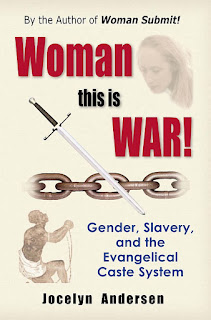Likewise the women yield to your own men that if any obey not the word they also may without The Word be won by the behavior of the wives [1]
[1] In 1 Peter 3:1, is the writer telling wives that they are basically slaves and should emulate the subjective behavior of slaves as instructed in 1 Peter 2:18?
This writer does not believe so. Hebrew and Greek scholar, Bruce Fleming, does not believe so either. Fleming teaches that 1 Peter 3:1 is not connected at all with 1 Peter 2:18-25 but rather an entirely new subject. He speaks about this in season four of his Eden Podcast, and he makes some very good points.
Fleming’s interpretation is possible. But regardless, this
writer believes there is no doubt [that in the mind of the biblical writer] 1 Peter
3:1 is a continuation of the subject introduced in the last eight verses of 1
Peter 2 [:18-25] about slaves enduring unjust harshness and violence from masters.
Without chapter and verse breaks [which is how the Bible was originally written],
the passage is clearly one unbroken conversation about one topic, that of slaves
being subject to masters and the writer leads seamlessly into the subject of women
subjecting themselves to men: QUOTE “Slaves [be] subject to [your] masters
with all fear not only to the good and gentle but also to the froward For this
[is] thankworthy if one for conscience toward God endure grief suffering
wrongfully For what glory [is it] if when you be beaten for your faults you
shall take it patiently But if when you do well and suffer [for it] you take it
patiently this [is] acceptable with God For even to this were you called we
are all called to this because Christ also suffered for us leaving us an
example that you should follow his steps Who did no sin neither was guile found
in his mouth Who when he was reviled, reviled not again When He suffered he
threatened not but committed [himself] to Him that judges righteously Who his
own self bare our sins in his own body on the tree that we being dead to sins
should live to righteousness by whose stripes you were healed For you were as
sheep going astray but are now returned to the Shepherd and Bishop of your
souls Likewise women …[be] in subjection to your own men that if
any obey not the Word they also may without the Word be won by the behavior of
the women.” END QUOTE
Peter certainly made a seamless connection when writing about the subjection of slaves to masters and the subjection of women to their men. This is confirmed in 1 Peter 3:5-6 where he wrote that Sara called Abraham master. Nowhere do we read in scripture where Sarah called Abraham master, so this statement must be taken from the Jewish extra-scriptural writings. These writings are commentary and not inspired scripture, but Peter was obviously familiar with them.
19th Century Greek and Hebrew scholar, Katherine Bushnell did not believe women are scripturally commanded to subject themselves to male dominance on any level. But she also believed that 1 Peter 3:1 was connected with 1 Peter 2:18 and she had this to say about it she began with the Hebrew and then show how the Greek [in 1 Peter] connected with it: QUOTE “The Old Testament sense in which "to be in subjection" is sometimes used, is highly suggestive and instructive. Psalm 62:1 reads in the English, "truly my soul waits upon God; from Him cometh my salvation.” At verse 5 of the same Psalm, we read: "My soul, wait thou only upon God.” In Psalm 37:7 we find the words: "Rest in the Lord and wait patiently for Him.” The words "wait" in the first passages, and the word "rest" in the last are all three represented in the Greek version by the single word hupotasso, "be in subjection," while the literal sense of the Hebrew original word is "be silent unto.” Compare this with 1 Peter 3:1,2, where wives are exhorted to win unbelieving husbands by "subjection.” Surely Peter is not here exhorting wives to blindly obey unbelievers, for if heathen, they would at once remand them back to the worship of the gods; if Jews, back to Judaism. Rather, they are to win them away from these by their "manner of life,” “without The Word,"--actions speaking louder than words. "Coupled with fear,"—such fear of God as would cause these women, so gentle, quiet, and patient in daily life, to be as adamant in their truth to God; and the husbands so overawed by their quiet maintenance of principle, whereas they are so ready to yield to their husbands when principle is not involved, that the husbands dare not try to compel their wives to violate conscience, and thus are themselves gradually led into the Christian faith. Where “subjection” is spoken of as a woman’s duty, without further immediate specification, it has been too readily assumed that this means subjection to a husband. But many women even from Apostolic days, and certainly an increasing large proportion of women in latter days, have no husbands. In both 1 Corinthians 14:34, “let them be in subjection”; and in 1 Timothy 2:11, “learn in all subjection,” this O. T. idea of waiting on God, or the thought of a spirit of humility towards God, may be all that is intended.” END QUOTE
Another View
The biblical writer’s direction to slaves and women were not biblical condonements of institutionalized slavery or systemically-mandated female subjection to males, but this writer believes the instruction found 1 peter 2:18 and 1 Peter 3:1 stem from concern for the safety of both.
It was taught then that all Christians [slaves, women, and men] were spiritually free in Christ, and all Christians [then and now] are equal Galatians 3:28,1 Peter 5:5, but depending on geographic location and local and national laws, all were, and are, not entitled to the same legal autonomy. While earth-bound, Roman slaves and women were still confined by oppressive laws and cultural expectations. That is still the case in many parts of the world today. 1 Peter 2 & 3 was both instruction and encouragement that a godly lifestyle in freely subjecting oneself to an unfortunate legally-mandated lot would not only *keep slaves safer but also was not un-noticed by God and would not go unrewarded. Women were higher on the social and legal scales than slaves, but their autonomy was still greatly restricted, and they were maliciously written about by philosophers, playwrights, and poets of the day. Though enjoying more legal protections, by the first century, domestic violence was still a very real part of Roman and Jewish life and first century Christian women were certainly at risk.
*Throughout Roman history, slaves could be killed at will by masters with no repercussion. By the time of Christ, manus marriage, which entitled Roman husbands to arbitrarily kill wives was replaced by sine manu marriage, whereby married women remained under the protection of their pater-families or of a male guardian appointed by their pater-families. This made the murder wives [with little to no legal or social repercussion] much more difficult. But domestic violence and abuse was another subject altogether. The Romans from Augustus on, liked to appear fair and gentle in public by passing some very good laws favoring women, but one Greek/Roman historian lamented that literary writings on the subject of domestic abuse and domestic violence [in the late republic] is frustratingly quiet. In other words, domestic abuse was winked at and swept under the rug.
Domestic violence and abuse are a given in any society that considers women as inferior or lesser than men. Virtually all the Church Fathers, considered women inferior and dangerous if given autonomy. They repeat this often in their writings. These same Church Fathers continue to be studied extensively today, as they should but with their anti-women rhetoric refuted in Christian seminaries, but it is not. It is simply ignored.
Gender-bias in Bible translation is rampant and creates a perceived scripture-bias against women where none exists. Holy Spirit inspired biblical writers do not exhibit such bias, but this is difficult to see when modern translators insist on holding to historical and traditional attitudes that are harmful to women. Even today, with progressive laws, three women a day [in the United States] die from domestic violence. A Methodist survey done in the 1970’s, found that one in six Christian women experienced violence at the hands of husbands or boyfriends. Domestic violence among professing Christians is just as rampant as among unbelievers. Why would anyone assume that First Century women were not at even greater risk when misogyny was the systemically legal order of the day and the norm for their culture?
Cultures exist today, where Christians are both legally enslaved and women are literally slaves of their husbands. Many of these women must hide their faith in Christ. They would not in any case be able to speak of Christ or share his Word with their husbands, who are literally and legally their masters. Many have zero legal recourse against abuse or potentially deadly domestic violence. They must, of necessity endure the harshness and danger, with seemingly no hope of escape. Just as 1 Peter 2:18 is not a message to Christian slaves that institutionalized slavery is God’s will, 1 Peter 3:2 is not a message to Christian women that God created them as inferiors to men or that it is his will for them tolerate violence and abuse. It was a message intended to protect [as much as possible] and encourage slaves and at-risk women of every era.
... Woman this is WAR! Gender, Slavery & the Evangelical Caste System: Andersen, Jocelyn: 9780979429323: Amazon.com: Books
What
readers are saying:
"This
book is well written, well researched, and a real eye opener."
"Andersen
is a gifted writer, and the book was easy to read even as it covers thoughtful
and sometimes technical information. I am glad I read it. I’ve read a great
deal about women in the church and home, and it is easy to think there is
nothing new to be learned or considered – but this book has a unique approach
and covers aspects overlooked by others. Everything is well documented with
footnotes in case you have questions or want sources."
"The
author is not only a gifted writer but clearly well-studied and informed."
" I
was pleased that translation bias was covered in a chapter, an issue that needs
to be addressed, and one that I find quite hard to bring up with lay people or
everyday believers who lack knowledge about Bible translation. We can trust our
Bibles, but we also need to acknowledge that certain passages are difficult to
translate and bias can come into play."
"Andersen
tackles most of the primary the teachings of complementarianism with an
impressive exegesis"
Author and speaker, Jocelyn Andersen, is an eclectic Christian writer. She is a Bible teacher who writes about many subjects including Bible prophecy and equality of the sexes. She is best known for her advocacy in domestic violence awareness. Her book, Woman Submit! Christians & Domestic Violence, has been a staple in the library of resources on that subject.
If the topic of God and Women interests you, join the conversation HERE.
To receive an
announcement from Amazon whenever a new book is released by Jocelyn Andersen,
subscribe to Her Amazon author's
page.
To
Contact Jocelyn: Use
the contact form in the sidebar of her blog at www.jocelynandersen.com to leave comments on her books, to reach her with questions,
or to request for her to come and speak at your group.




.png)
No comments:
Post a Comment